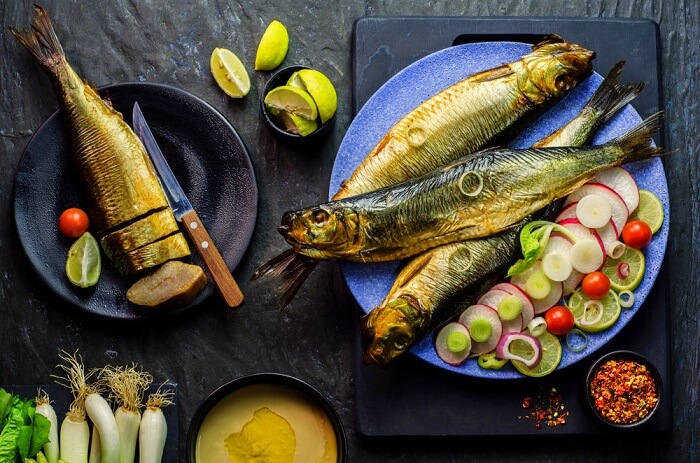What is Fesikh and How to Prepare Fesikh Recipe?

What is Fesikh (Egyptian Fish)?
Fesikh or Fessekh is a type of salted mullet that is dried and put in coarse salt for fifteen days or more until it acquires a silver color and a distinctive smell. It is fried, as it is eaten in some Arab countries, especially Palestine, on the first days of Eid al-Fitr and after the month of Ramadan as appetizer after fasting a whole month.
What is mullet?
Mullet fish belongs to the mullet family. It lives near the coasts, and is found in abundance in the Red Sea and the Mediterranean. It is called by several names, and it feeds on algae found in the sea. It has a salty taste, a silver color and an aroma that distinguishes it from others.
What is the Feast When Fesikh is Eaten?
Sham El-Nessim, a celebration that was held from the days of the Egyptian pharaohs, to celebrate the arrival of spring and the prosperity of life and the spread of the fun and bright summer colors and their belief that spring brings life and hope. This was called Sham El-Nessim, when they began to celebrate with the sunrise in early spring, where they go out in gardens, parks, and natural places, and eat foods that included fesikh. The salted fish symbolizes goodness, giving and blessing.
How to Prepare Fesikh?
Method
- Choosing the finest types of mullet
- Preparing containers made of strong wood that can withstand moisture and high sunlight.
- Fish is washed and cleaned very well in clean, clear water.

- Fesikh then is placed in the wooden barrels in reverse, that is, each fish is in a different direction from the other, and then pressed in the barrel by the method of stacking.
- The crushed coarse salt is sprinkled between the layers of fish and during the stacking process.
- It is then covered with cling wrap and then another layer of salt is placed to increase pressure on the fish and then covered with a tight lid, and it remains for fifteen days in Summer and for twenty-five days in the Winter, until it is opened and the fish, which is characterized by a strong pungent smell, is removed.
How to Prepare Feseekh at Home?
Fesikh can also be prepared at home, and it is the best way.
- Bring fresh mullet fish, incise its stomach, clean its bowels well, then wash and clean.
- Leave it to dry for two days near the window, with kitchen absorbing paper placed under the tray on which the fish is placed to absorb liquids.
- Make sure to keep turning it until it is completely dry, and then put it in glass containers. It should be sealed after filling its nostrils with coarse salt and immersing it in salt as well.
- Press and cover with cling wrap and then with a lid and leave in a warm place for fifteen days and for a longer period in Winter.
What is the Benefit of Eating Fesikh on the First Day of Eid al-Fitr?
The salinity in fesikh prepares the stomach to receive food after fasting for an entire month, and its excess salinity works to trap fluids in the body and replace the fluids lost during Ramadan fasting.
Side Effects of Eating Fesikh:
- Fesikh is a good source for the growth of parasites and bacteria if it is not manufactured in a good and healthy way. Bacteria are transmitted from flies if the fish is dried in the sun. The fish is decomposed and filled with bacteria that may affect the human nervous system and may cause strong muscle soreness, diarrhea, vomiting and other diseases.
- The salinity of fesikh is harmful in itself, as it increases blood pressure, fluid retention in the body and swelling of the feet, especially in pregnant women.
The Correct Way to Eat Fesikh:
- Put it in the freezer to reach the freezing stage after buying it to kill any bacteria that may be present in it.
- Cut off its head and tail and clean its guts.
- Soak it in clean, clear water for at least two days, changing the water every two or three hours, and put it in the fridge while it is soaking so that it will not be damaged and until its sharp salinity is reduced and a slight trace of salinity remains in it.
- Fry in hot and deep oil and serve with bread and salad.
- Or it is placed in a tray after being coated with flour and sprinkled with olive oil, then grilled and roasted in the oven.
Although fesikh has a wonderful taste, especially if grilled with olive oil, it is advised not to eat it a lot, especially for the elderly and pregnant women.




